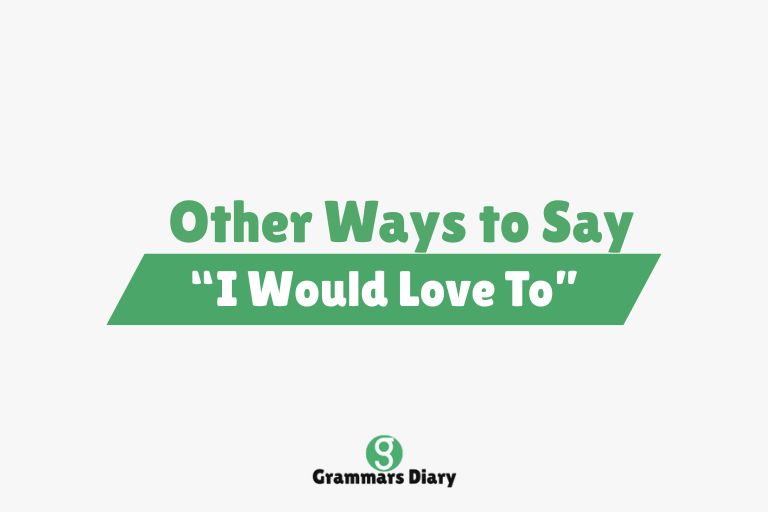“I would love to” is a warm, enthusiastic phrase often used to express willingness, desire, or excitement to do something. For instance, when someone says, “I would love to join you for dinner,” it signals genuine eagerness and positivity.
Still, there are numerous other ways to convey the same enthusiasm or intent, many of which can suit different tones, whether professional, friendly, or romantic. This blog post explores 22 strong, clear, and expressive alternatives to “I would love to,” helping you expand your vocabulary while preserving your heartfelt intent.
Other Ways to Say “I Would Love To”
1. I’d be delighted to
Example: “I’d be delighted to attend the conference next month.”
Meaning: Expresses pleasure and a formal tone of happiness about the opportunity or invitation.
Usage: Commonly used in professional or polite conversations where a respectful tone is preferred.
2. It would be my pleasure
Example: “It would be my pleasure to assist you with that project.”
Meaning: Shows willingness in a classy and gracious way, often implying that the speaker feels honored.
Usage: Ideal in customer service or formal interactions.
3. I’m more than happy to
Example: “I’m more than happy to help you move this weekend.”
Meaning: Indicates extra enthusiasm or a strong desire to help.
Usage: Works well in friendly settings and casual, supportive conversations.
4. I’d absolutely love to
Example: “I’d absolutely love to join the book club.”
Meaning: A slightly more emphatic version of “I would love to,” adding extra sincerity.
Usage: Used to add passion and warmth in informal or semi-formal settings.
5. Count me in
Example: “Dinner on Friday? Count me in.”
Meaning: A casual, enthusiastic agreement that sounds energetic and engaged.
Usage: Great for friendly or group-oriented situations, especially among peers.
6. I’m eager to
Example: “I’m eager to learn more about your company.”
Meaning: Shows that the speaker is excited and motivated to take part.
Usage: Fits both job interviews and academic or career-oriented discussions.

7. I’m keen on
Example: “I’m keen on helping out with the volunteer drive.”
Meaning: British in origin, this phrase signals interest and willingness.
Usage: Works well in professional or international English settings.
8. I can’t wait to
Example: “I can’t wait to see you perform.”
Meaning: Expresses strong anticipation and excitement.
Usage: Perfect for casual conversations and moments filled with emotion.
9. That sounds fantastic
Example: “A beach picnic this weekend? That sounds fantastic.”
Meaning: Conveys approval and happiness about the idea or suggestion.
Usage: Used in enthusiastic, informal responses to invitations or suggestions.
10. I’d be thrilled to
Example: “I’d be thrilled to take on the new leadership role.”
Meaning: Communicates high excitement and honor, especially in formal situations.
Usage: Often used in workplace or congratulatory contexts.
11. I’m totally up for it
Example: “Hiking on Saturday? I’m totally up for it.”
Meaning: Slang-like and casual, it expresses readiness and interest.
Usage: Best suited to informal and conversational speech among friends or close colleagues.
12. I wouldn’t miss it for the world
Example: “Your graduation? I wouldn’t miss it for the world.”
Meaning: Strongly expresses dedication and deep personal interest.
Usage: Ideal for meaningful occasions and heartfelt messages.
13. That would be amazing
Example: “Spending the weekend at your cabin? That would be amazing.”
Meaning: Implies excitement and enthusiasm for what’s being proposed.
Usage: Good for light-hearted or casual replies, especially with friends or family.
14. I’m totally on board
Example: “Expanding the program? I’m totally on board.”
Meaning: Suggests full support and willingness to participate.
Usage: Often used in team or group decision-making situations, informal or semi-formal.
15. I’m all in
Example: “You want to start a weekend project? I’m all in.”
Meaning: A strong, decisive way to show total commitment or participation.
Usage: Best for informal settings where full support and enthusiasm are being expressed.
16. I’m excited to
Example: “I’m excited to join the team next week.”
Meaning: Conveys genuine anticipation and joy about the upcoming action.
Usage: Suitable for personal, professional, and academic contexts.
17. I’m enthusiastic about it
Example: “I’m enthusiastic about helping out with the fundraiser.”
Meaning: Signals high energy and passion for a task or event.
Usage: Common in motivational or leadership scenarios.
18. I’d jump at the chance
Example: “A trip to Paris? I’d jump at the chance.”
Meaning: Highlights eagerness and a strong desire not to miss the opportunity.
Usage: Great for conversational replies when something exciting is proposed.
19. That sounds perfect
Example: “Meeting at the café at 10? That sounds perfect.”
Meaning: A kind and easy-going way to say you agree or like the plan.
Usage: Casual and polite, especially good for friendly and semi-formal interactions.
20. I’m game
Example: “Trying that new sushi place? I’m game.”
Meaning: Suggests openness and interest in participating, often in something a bit different or new.
Usage: Common in casual, playful conversations.
21. I’m so into this
Example: “A movie marathon? I’m so into this.”
Meaning: Informal and expressive, it shows you’re highly enthusiastic about the idea.
Usage: Works well in friendly, enthusiastic environments.
22. I’m honored to
Example: “I’m honored to be considered for this opportunity.”
Meaning: Combines gratitude and excitement, often used when receiving an offer or invitation.
Usage: Perfect for professional and respectful settings, especially when accepting a responsibility or recognition.
When to Use Different “I Would Love To” Alternatives
In Professional Settings
When you’re in a workplace or formal scenario, you might want to avoid overly casual expressions and instead use respectful and polished options such as “It would be my pleasure,” “I’d be delighted to,” or “I’m honored to.” These alternatives help you convey interest while maintaining professionalism and courtesy.
In Everyday Conversations
Casual or friendly interactions allow for much more relaxed expressions, where phrases like “Count me in,” “I can’t wait to,” or “I’m game” help you sound approachable, warm, and easygoing without sounding too formal or distant.
In Romantic or Intimate Contexts
When speaking to someone you have an emotional connection with, especially in personal or romantic contexts, phrases like “I’d absolutely love to,” “I wouldn’t miss it for the world,” or “That sounds perfect” can add emotional warmth, affection, and sincerity to your words, strengthening your bond with the listener.
Conclusion
“I would love to” is a heartfelt, welcoming phrase—but having a rich vocabulary of alternatives lets you fine-tune your tone, suit the setting, and express yourself in a more dynamic way. From professional formality to casual fun or intimate sincerity, the expressions we’ve explored allow you to connect more meaningfully with others.
Whether you’re replying to a friend’s invite, writing a formal response to a job offer, or expressing gratitude in a romantic conversation, having a diverse set of phrases at your fingertips makes your communication more impactful, expressive, and thoughtful.
FAQs
What does “I would love to” mean?
It expresses enthusiasm, interest, or a strong willingness to do something.
Is “I would love to” too casual for work?
It depends on context. While “I would love to” is polite and friendly, options like “It would be my pleasure” or “I’d be delighted to” may sound more professional.
Can I use “I would love to” in formal writing?
Yes, but it’s often better to use more formal alternatives depending on your audience or purpose.
What’s the best alternative to sound excited but still professional?
Try “I’m eager to” or “I’d be thrilled to”—both show enthusiasm while maintaining a professional tone.











